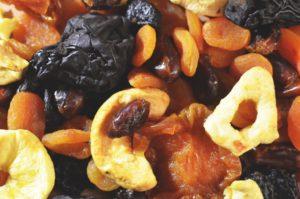What did Dr. Glaros learn in dental school that seems as true four decades later as it did back then? Here it is: “Avoid retentive, fermentable carbohydrates!”
In other words, don’t eat the sticky, sugary stuff.
“But what if it’s natural?” some folks might ask.
Let’s look at fruit juice, for instance. It’s certainly natural in so far as all you have to do to get it is juice the fruit. But it’s also extremely high in sugar and acid – much more than you would get from eating a single piece of fruit whole. In this sense, it’s not exactly all that healthy.
 Likewise, dried fruit is natural…and not so healthy if you eat too much. Again, the trouble is that drying fruit concentrates its sugars. A serving of fresh grapes will deliver 15 grams of sugars. A serving of raisins delivers more than double that amount.
Likewise, dried fruit is natural…and not so healthy if you eat too much. Again, the trouble is that drying fruit concentrates its sugars. A serving of fresh grapes will deliver 15 grams of sugars. A serving of raisins delivers more than double that amount.
At the same time, drying tends to destroy some nutrients, such as the vitamin C and resveratrol you’d get from the grapes.
Moreover, dried fruit tends to be sticky and clings to teeth – exactly why you’ll see “dried fruit” on just about any list of foods dentists tell you to steer clear from. Fermentable carbs such as sugars are the preferred food of the microbes that contribute to decay. The longer they’re in contact with the teeth, the more those pathogens can feed. The more they feed, the more waste they generate – metabolic byproducts that are highly acidic.
That’s the stuff that eats into your tooth enamel, ultimately giving the pathogens access to the vital inside of the tooth. Hello, infection. Hello, caries.
“Not so fast,” says the author of a paper we recently stumbled upon in the International Journal of Food Sciences and Nutrition.
There is a lack of good quality scientific data to support restrictive advice for dried fruit intake on the basis of dental health parameters and further research is required. A number of potentially positive attributes for dental health, such as the need to chew dried fruits which encourages salivary flow, and the presence of anti-microbial compounds and of sorbitol, also require investigation to establish the extent of their effects and whether they balance against any potentially negative attributes of dried fruit. Advice on dried fruit consumption should also take account of the nutritional benefits of dried fruit, being high in fibre, low in fat and containing useful levels of micronutrients.
Of course it should. But we should also question if those benefits are enough to offset, say, the 8 ½ teaspoons of sugar you get from that single serving of raisins, which not only has a dental impact but fuels systemic inflammation that can contribute to a host of health conditions.
And chewing anything increases salivary flow. If saliva offsets sugar, would she say it works just as well for, oh, a Snickers bar – which, by the way, actually contains less sugar than those raisins?
We could get tangled in these kinds of hypotheticals all day – presuming that the author’s claim about lack of evidence is valid. But clinical experience tells us, yes, overconsumption of any sticky, sugary foods – or simple carbs in general – is a problem.
Truth be told, our first thought when we saw this paper was whether their might be some conflict of interest – industry funding, for instance. Unfortunately, there’s no disclosure info on the paper itself. However, we did find that the author has extensive industry ties that would seem to bias her toward product promotion.
And that’s what the paper really seems to be doing – sanctioning dried fruit consumption despite all the advice of dental professionals. Notably, the author herself is not in dentistry but is an independent nutrition consultant.
As far as we’re concerned, the bottom line is this: Dried fruit is concentrated sugar. Because of that, it’s something to enjoy once in a while and in moderation. Too much sugar, whatever the source, is a problem.